Search Thermo Fisher Scientific
FIGURE: 1 / 5
IL-10 Antibody (710170) in ICC/IF
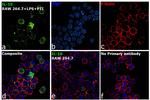
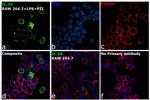
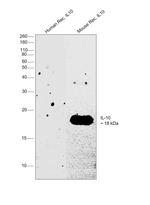
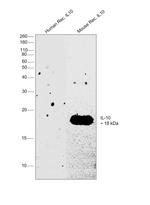
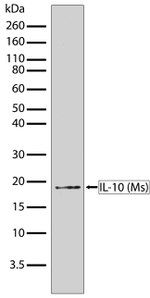
Product Details
710170
Species Reactivity
Host/Isotype
Expression System
Class
Type
Clone
Immunogen
Conjugate
Form
Concentration
Purification
Storage buffer
Contains
Storage conditions
Shipping conditions
RRID
Product Specific Information
Recombinant rabbit polyclonal antibodies are unique offerings from Thermo Fisher Scientific. They are comprised of a selection of multiple different recombinant monoclonal antibodies, providing the best of both worlds - the sensitivity of polyclonal antibodies with the specificity of monoclonal antibodies - all delivered with the consistency only found in a recombinant antibody. While functionally the same as a polyclonal antibody - recognizing multiple epitope sites on the target and producing higher detection sensitivity for low abundance targets - a recombinant rabbit polyclonal antibody has a known mixture of light and heavy chains. The exact population can be produced in every lot, circumventing the biological variability typically associated with polyclonal antibody production.
Target Information
IL-10 encodes a protein that acts as a cytokine and is primarily produced by monocytes, with some production by lymphocytes. This cytokine has various effects on immunoregulation and inflammation, including down-regulating the expression of Th1 cytokines, MHC class II Ags, and costimulatory molecules on macrophages. It also enhances B cell survival, proliferation, and antibody production. Additionally, IL-10 can block NF-kappa B activity and is involved in the regulation of the JAK-STAT signaling pathway. Knockout studies in mice have suggested that this cytokine is an essential immunoregulator in the intestinal tract. Mutations in this gene have been associated with an increased susceptibility to HIV-1 infection and rheumatoid arthritis. Diseases associated with IL10 include Graft-Versus-Host Disease and Human Immunodeficiency Virus Type 1.
For Research Use Only. Not for use in diagnostic procedures. Not for resale without express authorization.
References (0)
Bioinformatics
Protein Aliases: CSIF; Cytokine synthesis inhibitory factor; H-IL-10; il 10; IL-10; ILN; Interleukin; Interleukin-10; Interleukin10; MGC126450; MGC126451; RP11-262N9.1
Gene Aliases: CSIF; Il-10; Il10
UniProt ID: (Mouse) P18893
Entrez Gene ID: (Mouse) 16153

Performance Guarantee
If an Invitrogen™ antibody doesn't perform as described on our website or datasheet,we'll replace the product at no cost to you, or provide you with a credit for a future purchase.*
Learn more
We're here to help
Get expert recommendations for common problems or connect directly with an on staff expert for technical assistance related to applications, equipment and general product use.
Contact tech support
